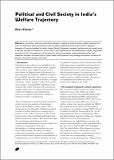| dc.contributor.author | Ehmke, Ellen | en |
| dc.date.accessioned | 2016-01-08T14:31:27Z | |
| dc.date.available | 2016-01-08T14:31:27Z | |
| dc.date.issued | 1/11/2011 | en |
| dc.identifier.citation | Ehmke, E. (2011) Political and Civil Society in India's Welfare Trajectory. IDS Bulletin 42(6): 104-110 | en |
| dc.identifier.issn | 1759-5436 | en |
| dc.identifier.uri | https://opendocs.ids.ac.uk/opendocs/handle/20.500.12413/7649 | |
| dc.description.abstract | In this article, a historical institutional approach is applied to study the Indian welfare trajectory. The aim is to understand which reproduction pattern possibly inhibited the constitutional call for adequate standards of living and welfare for India's citizens. Partha Chatterjee's concept of political and civil society forms a plausible reproduction mechanism, which offers a new explanation for the development of highly fragmented social policies. As a consequence of this mechanism, existing inequalities were perpetuated rather than overcome. However, the recent shift to rights?based social protection may challenge this pattern and allow for greater social policy change in the future. | en |
| dc.format.extent | 7 | en |
| dc.publisher | Blackwell Publishing Ltd | en |
| dc.relation.ispartofseries | IDS Bulletin Vol. 42 Nos. 6 | en |
| dc.rights.uri | http://www.ids.ac.uk/files/dmfile/IDSOpenDocsStandardTermsOfUse.pdf | en |
| dc.title | Political and Civil Society in India's Welfare Trajectory | en |
| dc.type | Article | en |
| dc.rights.holder | © 2011 The Author. IDS Bulletin © 2011 Institute of Development Studies | en |
| dc.identifier.doi | 10.1111/j.1759-5436.2011.00281.x | en |

